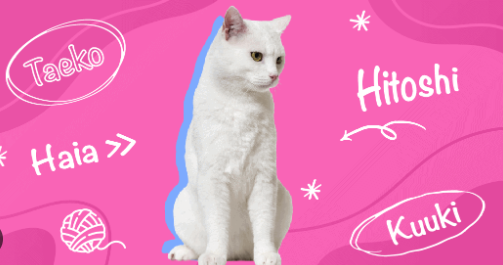In the Land of the Rising Sun, cats hold a revered position. Celebrated for their grace, independence, and mystical connection, felines have woven themselves into the very fabric of Japanese culture. This deep respect extends to the thoughtful selection of names bestowed upon these cherished companions. Unlike their Western counterparts, Japanese cat names often stray from the realm of simple sounds or pop culture references. Instead, they delve into a rich tapestry of meaning, reflecting nature, character traits, or even auspicious wishes for the future.
This article embarks on a captivating journey to explore the fascinating world of common cat names in japan. We’ll delve into the historical significance of feline naming customs, unpack the beautiful meanings hidden within these names, and unveil the cultural influences that shape them. Whether you’re a proud cat owner seeking the purrfect name for your furry friend or simply captivated by the elegance of Japanese language, this comprehensive guide will leave you enlightened and inspired.

A Historical Meowment: The Evolution of Cat Names in Japan
The history of cat names in Japan is intricately linked to the evolving relationship between humans and felines. Cats were first introduced to Japan around the 6th century AD, primarily for their mousing skills. During this period, names were often utilitarian, reflecting a cat’s function as a pest controller. Examples include “Neko” (猫), the generic term for cat, and “Goro” (五郎), meaning “fifth son,” which might have indicated the order a cat was born in a litter.
As cats transitioned from working animals to cherished companions, their names began to reflect this growing affection. By the Edo period (1603-1868), a surge in cat ownership led to a blossoming of more creative and meaningful names. Literary influences, a burgeoning appreciation for nature, and the rise of auspicious symbols all played a role in shaping this naming evolution.
Today, Japanese cat names are a delightful blend of tradition and innovation. While some owners opt for classic names steeped in history, others embrace modern trends that reflect popular culture or personal preferences.
A Symphony of Symbols: Decoding the Meanings Behind Japanese Cat Names
Japanese cat names are more than just playful sounds; they are windows into the owner’s hopes, dreams, and adoration for their feline companion. Let’s explore some of the most common themes and their symbolic interpretations:
- Nature: The beauty of the natural world heavily influences Japanese cat names. Names like Yama (山, meaning mountain), Sora (空, meaning sky), and Umi (海, meaning ocean) evoke a sense of vastness and tranquility, reflecting the owner’s desire for their cat to possess a peaceful spirit.
- Colors: Colors hold significant meaning in Japanese culture. Names like Kuro (黒, meaning black) or Shiro (白, meaning white) are straightforward, while Aka (赤, meaning red) or Mikan (蜜柑, meaning mandarin orange) might symbolize passion or good fortune.
- Flowers and Plants: Japan boasts a rich floral tradition, and cat names often pay homage to these beautiful blooms. Sakura (桜, meaning cherry blossom) represents fleeting beauty, while Hana (花, meaning flower in general) signifies joy and prosperity.
- Auspicious Symbols: Owning a lucky cat is a cherished desire in Japanese culture. Names like Fuku (福, meaning luck) or Hachiko (八紘, meaning prosperity) express the owner’s hope for good fortune to grace their feline friend.
- Food: The delightful world of Japanese cuisine finds its way into cat names as well. Names like Mochi (餅, a sweet rice cake) or Udon (うどん, a thick wheat noodle) showcase the playful and affectionate bond between owner and cat.
- Temperament: Just like humans, cats possess unique personalities. Names like Yamato (大和, meaning brave) or Yoru (夜, meaning night) might reflect a cat’s courageous spirit or nocturnal habits.
Unveiling the Meanings of Popular Japanese Cat Names
| Cat Name | Meaning |
|---|---|
| Momo (桃) | Peach |
| Kuro (黒) | Black |
| Hana (花) | Flower |
| Sora (空) | Sky |
| Chibi (ちび) | Tiny |
| Haru (春) | Spring |
| Yuki (雪) | Snow |
| Taro (太郎) | Firstborn Son (used for males) |
| Hime (姫) | Princess (used for females) |
| Maru (まる) | Round |
Beyond these categories, a delightful quirk of Japanese cat names is the use of onomatopoeia. Names like Nyan (にゃん, the sound of a meow) or Goro (ごろごろ,
The Art of Choosing the Purrfect Name: A Guide for Cat Owners
Selecting a name for your feline friend is a significant decision. After all, this moniker will become a cherished part of your relationship for years to come. Here are some pointers to guide you through this delightful process when considering a Japanese name:
- Consider your cat’s personality: Think about your cat’s unique traits. Are they playful and energetic? Regal and aloof? Names that reflect their temperament can create a special connection.
- Embrace the sound: Japanese is a beautiful language known for its euphony. Opt for names that are pleasing to the ear and easy to pronounce for both you and your cat.
- Delve into cultural significance: Explore the symbolism behind different names. Does a particular meaning resonate with your hopes for your cat?
- Don’t be afraid to be creative: While there are many traditional names to choose from, feel free to get creative and invent a unique moniker that holds special meaning for you and your cat.
- Test out the name: Once you’ve narrowed down your choices, try saying the names out loud and observe your cat’s reaction. Do they perk up at a particular sound?
Here are some additional resources to help you find the purrfect Japanese name for your cat:
- Japanese Cat Names Website: This website offers a comprehensive list of Japanese cat names categorized by meaning, gender, and even fur color https://www.rover.com/blog/300-japanese-cat-names-for-your-cuddly-cat/.
- Kanji Koohii: This website allows you to search for Japanese words and phrases based on their meaning or pronunciation https://kanji.koohii.com/.
- Imabi: This online dictionary provides definitions and pronunciations for Japanese words https://jisho.org/search/junbi.
FAQs: Unveiling the Mysteries of Japanese Cat Names
- Are there any lucky names for cats in Japan?
Yes, many Japanese cat names carry auspicious connotations. Names like Fuku (meaning luck), Hachiko (meaning prosperity), or Tama (meaning jewel) express the owner’s desire for good fortune to bless their feline companion.
- Can I name my cat after a human name in Japan?
While uncommon, it’s not entirely unheard of for cats to have human names in Japan. However, these names are typically chosen for their meaning or sound rather than their association with a specific person.
- How do I pronounce Japanese cat names correctly?
Japanese pronunciation can be tricky for non-native speakers. Utilizing online resources like audio dictionaries or translation tools with audio functionalities can help you master the pronunciation of your chosen name.
- What are some popular Japanese cat names for males vs. females?
Traditionally, male cat names often end in “o” sounds, such as Taro (meaning firstborn son) or Yamato (meaning brave). Female cat names might incorporate the suffix “ko” meaning “child” or utilize nature-inspired names like Sakura (cherry blossom) or Hana (flower). However, these are not strict rules, and many owners choose names that transcend gender limitations.
Conclusion
The world of Japanese cat names is a captivating tapestry woven from tradition, cultural symbolism, and a deep love for feline companions. By understanding the historical context, the beautiful meanings embedded within these names, and the cultural influences that shape them, you gain a deeper appreciation for this unique naming practice. So, the next time you encounter a fluffy friend sporting a charming Japanese name, remember the story and sentiment it carries. With a little exploration, you too can discover the purrfect Japanese name to express your love and admiration for your cherished cat.






